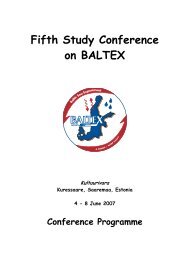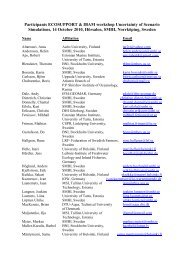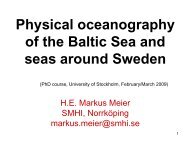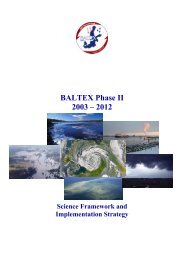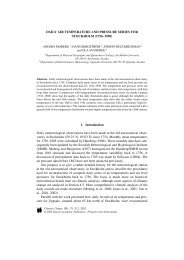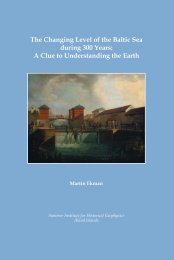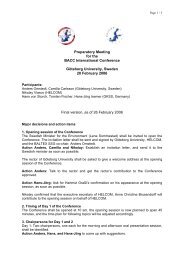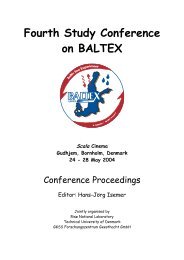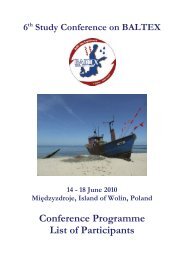Low (web) Quality - BALTEX
Low (web) Quality - BALTEX
Low (web) Quality - BALTEX
You also want an ePaper? Increase the reach of your titles
YUMPU automatically turns print PDFs into web optimized ePapers that Google loves.
216<br />
compared to SNOTEL. The departures can partly be<br />
attributed to the too high temperatures simulated by<br />
NARCCAP RCMs compared to SNOTEL. Another reason<br />
for the partially great deviations is that SNOTEL probably in<br />
general overestimates snow cover depth. The SNOTEL<br />
stations were placed based on the goal to collect information<br />
primarily for run off forecasting purposes, and not to<br />
measure and monitor snow as a climate variable. Therefore,<br />
SNOTEL sites are mostly located in troughs, shadowed<br />
areas and generally, where the seasonal snow pack lasts a<br />
relatively long time.<br />
16th Conference on Climate Variations and Change. 9-13<br />
January, 2005. Paper<br />
16 J6.10, pp. 235-238 Washington, D.C.<br />
In order to gain some insights into possible reasons and<br />
sources leading to the biases found, some analyses regarding<br />
the LSS were undertaken. The LSS dictates and forces the<br />
processes related to snow in a RCM. Here, there was no<br />
obvious larger similarity found between RCMs using the<br />
same LSS. In particular also NARR, which uses the same<br />
LSS (NOAH), as the RCMs WRF, MM5 and ECPC, did not<br />
show specific similarities with the respective RCMs.<br />
Therefore, it seems that the LSS’s function is marginal for<br />
the final output regarding snow and that the biases found can<br />
not directly be attributed to the LSS used by the RCM.<br />
4. Conclusion and Perspectives<br />
It can be concluded so far that the annual snow cycle is, in<br />
general, represented relatively well by the NARCCAP<br />
simulations but underestimates the amount of snow.<br />
Quantifying this underestimation in absolute values is,<br />
however, difficult. This is because the SNOTEL<br />
measurements most probably overestimate the effective<br />
snow depth due to the primary goal of the SNOTEL network<br />
as mentioned above. Furthermore, a comparison between<br />
point measurements and gridded data is always somewhat<br />
questionable. Additionally, a detailed attribution of the<br />
biases to e.g. the LSS or the elevation differences between<br />
models and reality is finally not possible. Because of the<br />
many uncertainties associated with such analyses, it is<br />
advised and proposed to refer to such analyses as ‘an<br />
assessment or evaluation of the performance of the models’<br />
rather than as ‘a validation of models’.<br />
Nevertheless such analyses are fundamental for the impacts<br />
community. It is essential that impacts modeler know about<br />
the range of uncertainty associated with RCM outputs and<br />
that they account accordingly for it in their studies.<br />
References<br />
Barnett, T.P., Adam, J.C., Lettenmaier, D.P., Potential<br />
impacts of a warming climate on water availability in snowdominated<br />
regions, Nature 438, 303-309, 2005<br />
Cohen, J., & Rind, D., The effect of snow cover on the<br />
climate, J. Climate, 689-706, 1991<br />
Christensen, N.S., Wood, A.W., Voisin, N., Lettenmaier,<br />
D.P., Palmer, N., The effect of climate change on the<br />
hydrology and water resources of the Colorado River Basin.<br />
Climate Change 62, 337-363, 2004<br />
Leung, L., R. & Qian, Y., The sensitivity of precipitation<br />
and snowpack simulations to model resolution via nesting in<br />
regions of complex terrain, J. Hydrometerology 4, 1025-<br />
1043, 2003<br />
Mearns, L.O. et al., 2005: NARCCAP, North American<br />
Regional Climate Change Assessment Program, A multiple<br />
AOGCM and RCM climate scenario project over North<br />
America. Preprints of the American Meteorological Society




